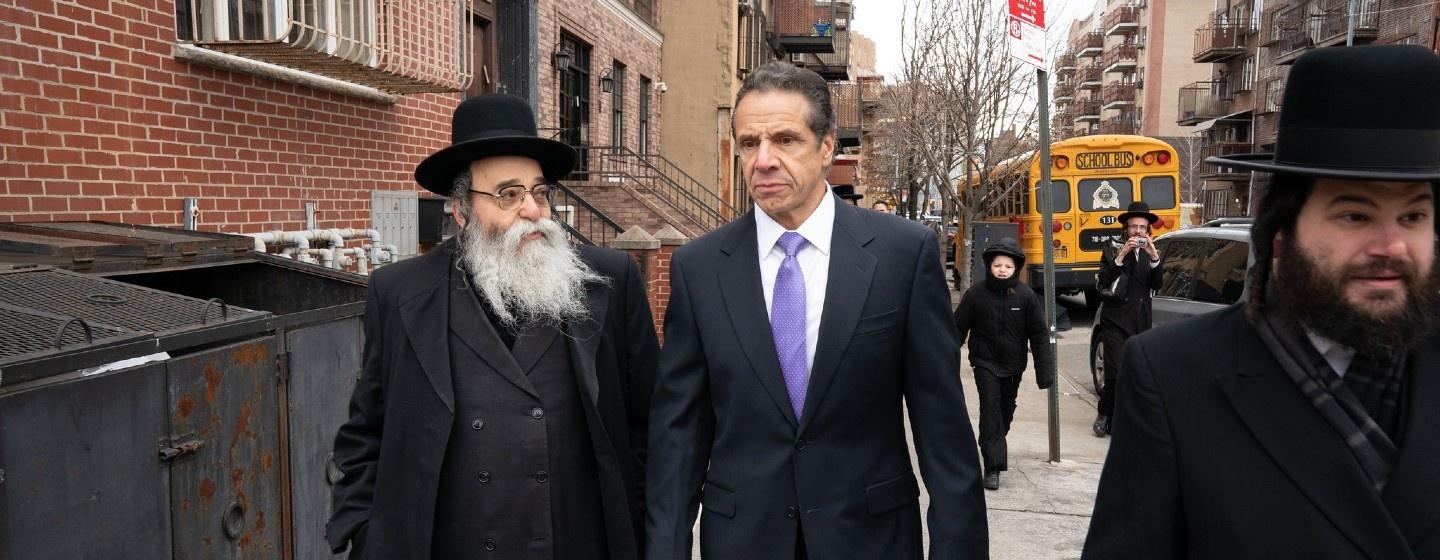Cuomo: State to 'Take Over' Hotspot Enforcement, May Close Religious Institutions

The state health agency in New York will deputize local government personnel to enforce regulations and guidelines related to the coronavirus in a handful of downstate zip codes where the infection rate has collectively reached 5.5%, Gov. Andrew Cuomo said Monday.
The state Department of Health could also bar religious gatherings in those areas, but Cuomo said he’ll meet Tuesday with church leaders before taking that step.
In the meantime, Cuomo said Monday that the state will move all schools in the New York City hotspot zip codes to remote learning, starting Tuesday. The clusters have popped up in areas of Brooklyn, Queens, Orange County, Rockland County, and Long Island.
"On the schools in these areas, not all of them have been tested, so we don't have data on all the schools in these hotspot clusters,” Cuomo said. “That troubles me.”
Schools may also be closed in zip codes outside New York City that are experiencing spikes in the infection rate, but Cuomo said the state hasn’t made a decision on those districts. The statewide infection rate is currently at 1.22%.
The announcement came after New York City Mayor Bill de Blasio said, on Sunday, that he was seeking state approval to close schools and some nonessential businesses in areas experiencing high infection rates.
Cuomo said Monday that he’d spoken about the plan Monday morning with de Blasio, along with New York City Council Speaker Corey Johnson, New York City Comptroller Scott Stringer, and United Federation of Teachers President Michael Mulgrew.
While he granted de Blasio’s request to close schools in the hotspot zip codes, Cuomo said he wanted to take a closer look at the data before shutting down businesses as well. It’s possible that businesses in one part of the zip code could stay open, while others close, he said.
“The businesses are not mass spreaders,” he said. “We’re talking about small stores, not large box stores in these communities.”
The viral spread in the hotspot clusters can, instead, be mostly attributed to schools reopening and religious gatherings, Cuomo said. Some religious gatherings in New York City have been spotted with hundreds of attendees, he said, with little compliance of regulations.
Cuomo said he’ll be speaking with leaders from the Orthodox Jewish community Tuesday about compliance with the state’s regulations, and a commitment to enforcing those rules. If they decline his request, the state may shut down religious institutions in those clusters, he said.
"If I do not have the agreement from the religious community directly as a starting point, then we will close down the religious institutions," Cuomo said.
As part of the new plan, Cuomo said the state will place a new focus on enforcement in the hotspot zip codes, both in New York City and outside the five boroughs.
Instead of supplementing local efforts, Cuomo said Monday that the state will take over enforcement of coronavirus-related rules and regulations in those areas. That’s after he, repeatedly, said that local officials weren’t doing enough to prevent a future outbreak.
"The state is going to take over enforcement oversight in all those hotspot clusters,” Cuomo said. “Local governments will need to provide us personnel, but the state will take over the enforcement with the local personnel."
Cuomo said the state Department of Health will form a new task force to handle the enforcement. That task force will deputize personnel provided to the agency by local governments, which can assign law enforcement or other employees for the task.
Those assigned to the task force will then have the power to issue fines and summonses to individuals not complying with the state’s rules, including social distancing and face coverings.
Related
COVID-19 clusters have popped up in New York. Find out what the state is doing about them.


